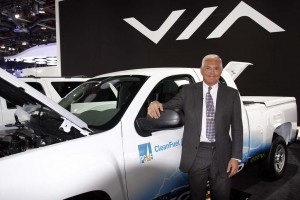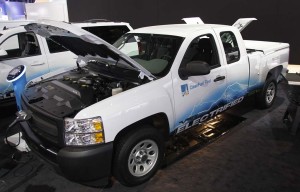
Bob Lutz, former vice chairman of General Motors, is advising Via Motors, which is converting GM trucks to run on electricity. "I do believe that the industry is about to be transformed."
Chevrolet’s groundbreaking Volt extended-range electric vehicle is a great first step, but a fledgling new company wants to do a similar system for light-duty trucks.
Considering the poor mileage such trucks get and the number of them on the road – making up half of all vehicles in this country – the company’s vehicles could have a huge impact in reducing carbon dioxide emissions and fuel use. And it will help that the company has one of important car executives in a generation lending his name to the project.
Via Motors is a startup company that converts existing full-size pickup trucks – and soon large vans and sport utility vehicles – into extended-range electric vehicles or E-REV for short.
Speaking at a Detroit Auto Show press conference, Bob Lutz, General Motors’ former vice chairman and the father of the Volt, said light truck owners are recognizing the benefits of Via’s system.

Via Motors' system replaces the transmission with a 402-horsepower electric motor, but keeps the truck's base 4.3-liter V-6 engine.
Lutz said fleet operators such as Pacific Gas & Electric and Verizon are buying the trucks because they recognize the savings they will realize.
“I do believe this industry is about to be transformed,” Lutz said.
Via’s system uses a 402-horsepower electric motor to provide up to 40 miles range on electricity alone.
“That’s a lot of oomph for a vehicle from a package this size,” said Alan Perriton, Via’s chief operating officer.
Like the Volt, after the system’s lithium-ion battery is exhausted, the vehicle’s onboard gasoline generator kicks in to provide up to extend the truck’s range to about 400 miles.
Best of all, company officials said the vehicle suffers only a slight loss of performance compared to regular trucks. The converted trucks weigh 300 pounds more than the standard trucks, so payload and towing capacities are reduced by that amount.
Besides saving fuel, the trucks offer another advantage. They can be used as rolling generators, meaning campers can plug in a hair dryer, caterers can run their refrigerators and a carpenter can run his power tools.
Greg Pruett, PG&E corp.’s senior vice president of corporate affairs, said the utility has 3,500 trucks in its fleets and converting them to E-REV could save them $9.5 million annually.
Via’s Richard Clayton said the company takes GM trucks equipped with the base 4.3-liter V-6 engine to convert to what it calls VTRUX. The company removes the transmission and inserts its electric motor, along with a 24.4 kW battery. All added equipment – except the box for the electrical outlets – goes under the truck’s body. That box is mounted in the truck bed. The engine stays to serve as the onboard generator. Two-wheel-drive or four-wheel-drive trucks are available.
Clayton said that currently, it is selling the unused transmissions, but it is negotiating with GM to supply the trucks without the transmissions. Roush Enterprises in Livonia is making the conversions.
He said that the company plans to deliver 2,700 of the trucks in 2012, but will ramp up to 20,000 units in 2013.
Via is getting its batteries from A123, but is working on securing a second source.
Prices start at $79,000 for the pickup.
Fleets See Benefits of Electrifying Light-duty Trucks
Converter installs Chevy Volt-style E-REV system in GM trucks.
Chevrolet’s groundbreaking Volt extended-range electric vehicle is a great first step, but a fledgling new company wants to do a similar system for light-duty trucks.
Considering the poor mileage such trucks get and the number of them on the road – making up half of all vehicles in this country – the company’s vehicles could have a huge impact in reducing carbon dioxide emissions and fuel use. And it will help that the company has one of important car executives in a generation lending his name to the project.
Via Motors is a startup company that converts existing full-size pickup trucks – and soon large vans and sport utility vehicles – into extended-range electric vehicles or E-REV for short.
Speaking at a Detroit Auto Show press conference, Bob Lutz, General Motors’ former vice chairman and the father of the Volt, said light truck owners are recognizing the benefits of Via’s system.
Lutz said fleet operators such as Pacific Gas & Electric and Verizon are buying the trucks because they recognize the savings they will realize.
“I do believe this industry is about to be transformed,” Lutz said.
Via’s system uses a 402-horsepower electric motor to provide up to 40 miles range on electricity alone.
“That’s a lot of oomph for a vehicle from a package this size,” said Alan Perriton, Via’s chief operating officer.
Like the Volt, after the system’s lithium-ion battery is exhausted, the vehicle’s onboard gasoline generator kicks in to provide up to extend the truck’s range to about 400 miles.
Best of all, company officials said the vehicle suffers only a slight loss of performance compared to regular trucks. The converted trucks weigh 300 pounds more than the standard trucks, so payload and towing capacities are reduced by that amount.
Besides saving fuel, the trucks offer another advantage. They can be used as rolling generators, meaning campers can plug in a hair dryer, caterers can run their refrigerators and a carpenter can run his power tools.
Greg Pruett, PG&E corp.’s senior vice president of corporate affairs, said the utility has 3,500 trucks in its fleets and converting them to E-REV could save them $9.5 million annually.
Via’s Richard Clayton said the company takes GM trucks equipped with the base 4.3-liter V-6 engine to convert to what it calls VTRUX. The company removes the transmission and inserts its electric motor, along with a 24.4 kW battery. All added equipment – except the box for the electrical outlets – goes under the truck’s body. That box is mounted in the truck bed. The engine stays to serve as the onboard generator. Two-wheel-drive or four-wheel-drive trucks are available.
Clayton said that currently, it is selling the unused transmissions, but it is negotiating with GM to supply the trucks without the transmissions. Roush Enterprises in Livonia is making the conversions.
He said that the company plans to deliver 2,700 of the trucks in 2012, but will ramp up to 20,000 units in 2013.
Via is getting its batteries from A123, but is working on securing a second source.
Prices start at $79,000 for the pickup.
